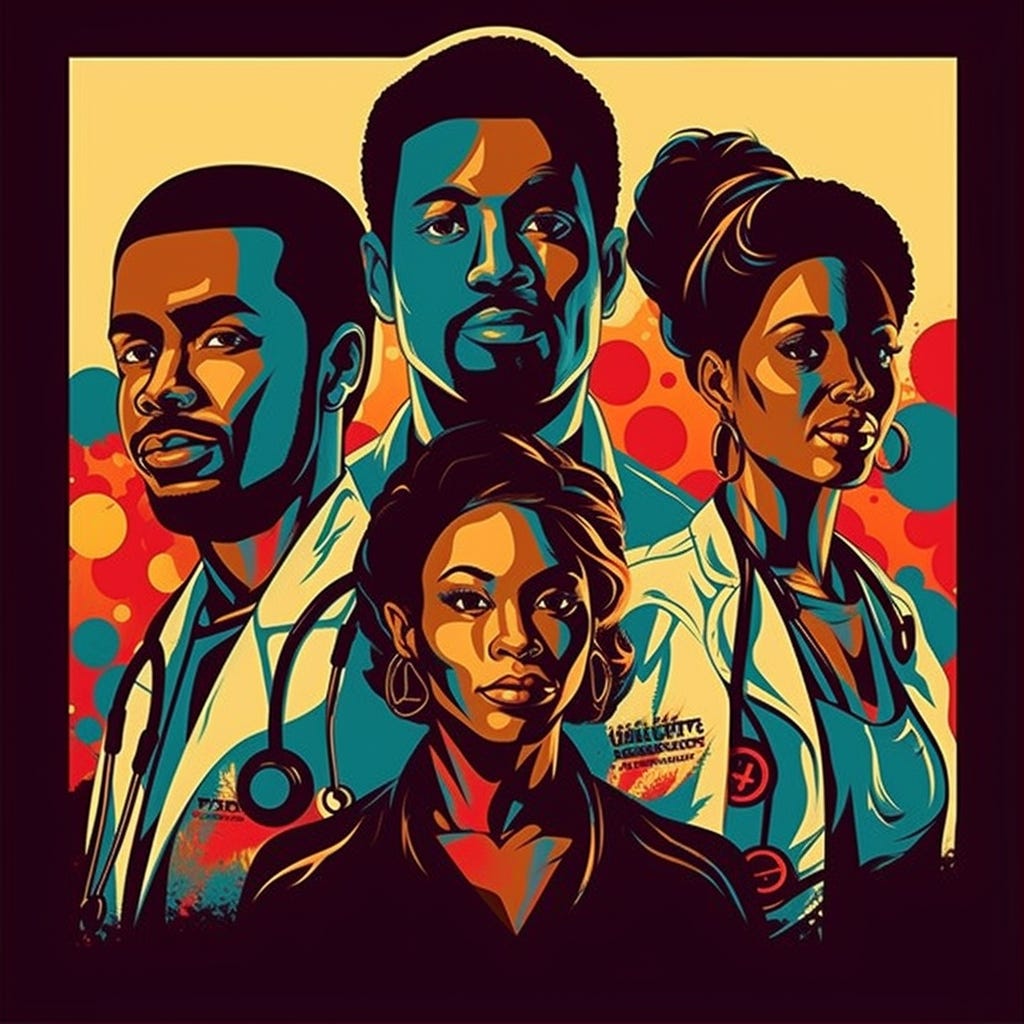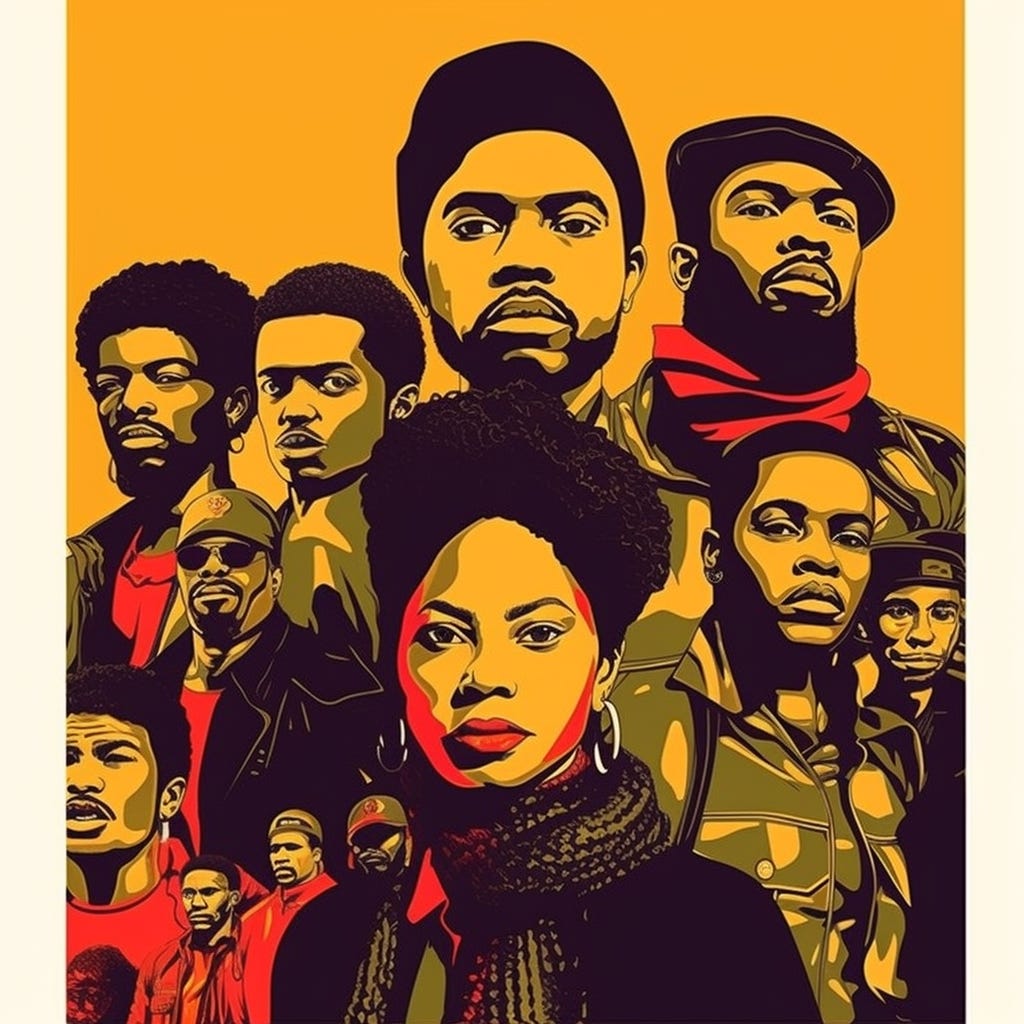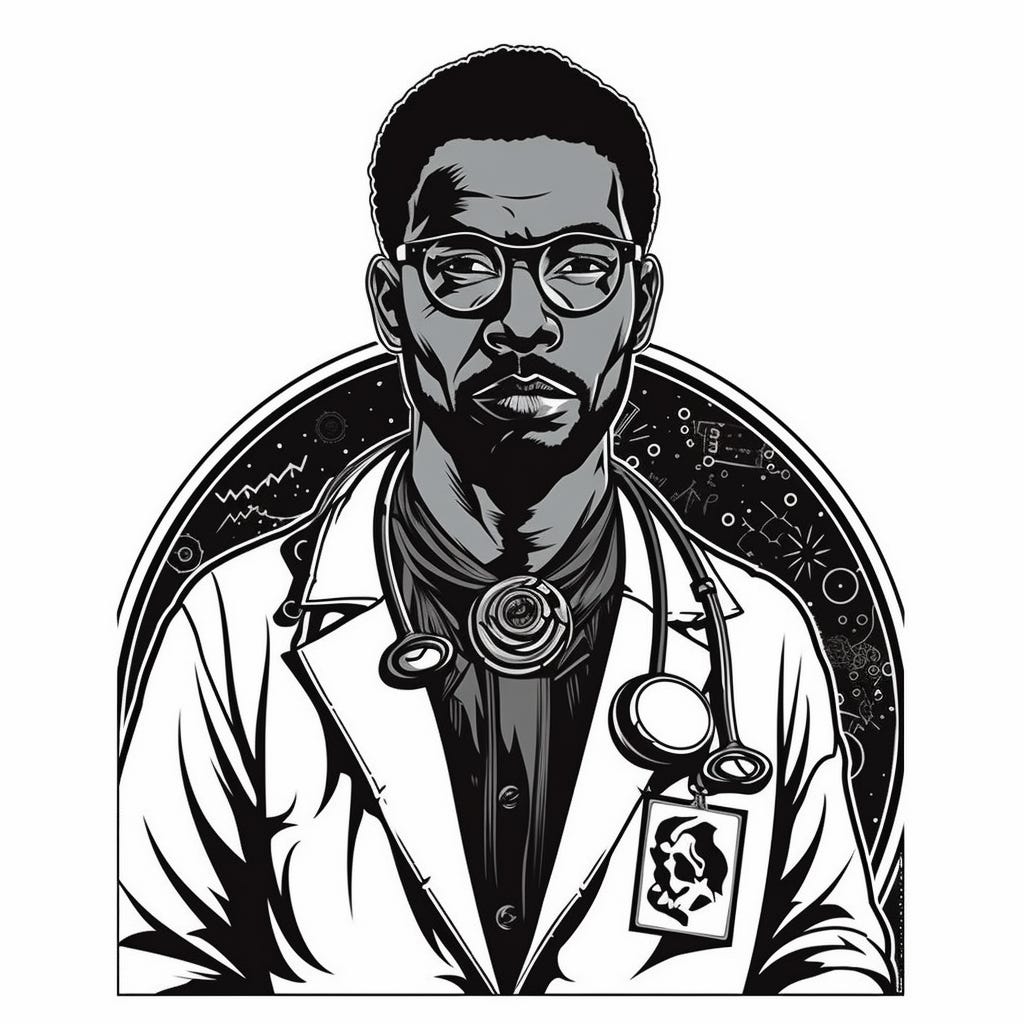Good Trouble, Better Health: The Black Panther Party’s Acupuncture Clinics
How the Black Panthers Reinvented Community Health
Greetings directly from the heart of the 2023 American Psychiatry Association Conference! I'm presently enveloped in a talk on a topic close to my heart—"Making Good Trouble in Psychiatry". As this session unfolds, the healthcare contributions of the Black Panther Party (BPP) have taken center stage, and I'm eager to share this history with you.
The mention of the Black Panther Party usually conjures vivid images of bold socio-political and militant activism. But what’s overlooked is that their movement was also one of healing—of bodies, minds, and communities. This legacy places them at the heart of what we now call healing justice: the understanding that restoring health requires dismantling systems of oppression and creating more love-filled models of care.
Many are aware of the BPP’s pioneering social programs, such as one of the country's largest free breakfast programs. But fewer know about their free acupuncture clinics, their groundbreaking Sickle Cell Anemia initiative (the first of its kind in the U.S.), and their bold recognition that health and healing is power.
Healing Justice in Practice: Free, Community-Led Healthcare
Among the Black Panther Party’s most enduring contributions is their radical reimagining of healthcare—what we now recognize as healing justice in action. Their People’s Free Medical Clinics, launched in the late 1960s and early ’70s, were more than just health outposts. They were expressions of collective care and resistance—offering free, high-quality healthcare to Black and marginalized communities.
These clinics weren’t charity; they were a challenge to systemic neglect. From screenings for hypertension and diabetes to prenatal care, they removed financial and racial barriers, affirming what the BPP made clear: healthcare is a human right, not a privilege.
A Holistic Vision: Prevention, Empowerment, and Political Education
The Panthers’ clinics didn’t stop at treatment—they were prevention-oriented, education-driven, and community-embedded. Health education was foundational, helping patients understand their bodies and equipping them to care for themselves and each other. This wasn’t just about medical literacy—it was about power. When people could name what was happening in their bodies and why, they could also name the systems making them sick.
When people could name what was happening in their bodies and why, they could also name the systems making them sick.
This proactive, wellness-based model anticipated what today we call “whole person” or “integrative care,” but grounded it firmly in the reality of Black liberation and survival.
Care Rooted in Community and Solidarity
These clinics thrived because they were built with and for the communities they served. Staffed by local residents—including volunteers and sometimes former patients—they fostered deep trust, created jobs, and responded directly to community-defined needs. This community-rooted approach wasn't just efficient—it was transformative. People saw themselves not as passive recipients of care but as co-creators of a healing ecosystem.
Mental Health as Liberation Work
In a time when mental health was rarely discussed in Black communities—and certainly not supported by state institutions—the Black Panther Party broke the silence. They named mental health as vital, political, and urgent. Their clinics integrated counseling, peer support, and care for emotional trauma, recognizing that mental wellness couldn’t be separated from poverty, racism, violence, or systemic neglect.
This understanding was decades ahead of mainstream psychiatry. The BPP viewed mental health as collective, contextual, and inseparable from justice—a perspective now central to healing justice movements across the country.
The Black Panther Party’s Radical Acupuncture Legacy
Not many people know The Black Panther Party (BPP) pioneered an innovative form of community healthcare: free acupuncture clinics. In the early 1970s, as heroin addiction ravaged Black and Latino neighborhoods, BPP activists (often in coalition with groups like the Young Lords) turned to acupuncture as a grassroots solution to health and mental health. They established free acupuncture treatment programs in specific communities – notably the South Bronx in New York and Panther clinics in Oakland, California – bringing holistic health care to people who had been neglected or mistreated by mainstream institutions. These community-run clinics not only treated thousands of individuals for addiction and trauma but also built deep trust and empowerment in the neighborhoods they served. What follows is a community-centered look at where and how the Panthers implemented acupuncture, the impact it had on public health and trust, how it fit into their broader survival programs, the development of the NADA protocol, and why the Panthers embraced acupuncture as a mental health intervention in marginalized communities.
Grassroots Healing in the South Bronx
In 1970, members of the Young Lords, Black Panther Party, and Health Revolutionary Unity Movement transformed a wing of Lincoln Hospital in the South Bronx into a revolutionary clinic: Lincoln Detox. It became one of the first in the U.S. to systematically use acupuncture for addiction and trauma treatment. Under the leadership of Dr. Mutulu Shakur, the clinic treated more than 35,000 heroin and methadone users in its first five years.
Lincoln Detox combined acupuncture, political education, and peer counseling into a holistic model of care. Many staff were former patients, helping foster a strong sense of trust and ownership. This peer-led structure challenged a medical system that had historically marginalized and criminalized poor communities of color.
West Coast Innovation in Oakland
Meanwhile, on the West Coast, the Panthers were creating their own integrative care model. Dr. Tolbert Small, the Party’s physician in Oakland, brought acupuncture to the George Jackson Free Medical Clinic after witnessing China’s “barefoot doctor” system during a 1972 visit. Inspired by this approach to community-based medicine, he used acupuncture to treat chronic pain, trauma, and withdrawal symptoms—all provided free of charge.
These Oakland clinics reflected the Panthers’ commitment to accessible, community-controlled care, blending Chinese medicine with Black liberation politics.
Health, Trust, and Collective Healing
Panther-led acupuncture clinics offered more than physical treatment—they created spaces of collective healing. Unlike government programs that relied on methadone or institutional care, these clinics provided drug-free alternatives, rooted in compassion and self-determination. Patients were treated not just as “addicts,” but as neighbors, learners, and contributors to community recovery.
Because many practitioners were locals with shared experiences, the clinics fostered deep trust. People came for treatment—and stayed to help others. These spaces became hubs of resilience, healing not only bodies but also the social and political wounds bringing them back to wholeness.
From the Bronx to the World: The NADA Protocol
Out of the Lincoln Detox clinic emerged the now-global NADA protocol—a five-point ear acupuncture method used to treat addiction, trauma, and stress. Though the National Acupuncture Detoxification Association (NADA) was formally founded in 1985, its method was born in the community-led experiments of Lincoln Detox and refined through years of grassroots practice.
Today, the NADA protocol is used in rehab centers, prisons, disaster zones, and veterans’ clinics worldwide—a quiet but enduring legacy of the Panthers’ revolutionary approach to healing.
Why Acupuncture? A Revolutionary Choice
The Black Panthers chose acupuncture both strategically and symbolically. After generations of racist abuse by the medical system—from Tuskegee to forced sterilizations—acupuncture represented a trusted, low-cost, and teachable alternative. It was a tool the community could control, outside of hospitals, insurance systems, or pharmaceutical dependency.
The model was deeply influenced by Maoist China’s “barefoot doctor” movement, which trained local people to provide basic care in rural areas. Panthers like Small and Shakur adapted this idea to U.S. inner cities: a people’s medicine, capable of healing from the ground up.
Enduring Legacy and Continued Inspiration
Though many of these clinics were shut down by the late 1970s—through both defunding and government repression—their legacy lives on. Every time a counselor uses the NADA protocol, or a community health worker practices acupuncture in a harm-reduction setting, they echo the Panthers’ vision.
The Black Panther Party’s acupuncture programs remain a powerful example of grassroots medicine, radical care, and community resilience. They show that true healing happens when communities take health into their own hands—and treat care as a form of liberation.
The Black Panthers: Healing Is Power
The Black Panthers didn’t wait for permission to heal their people. They built their own systems, trained their own healers, and created new models of care. Their acupuncture programs weren’t just about needles or protocols—they were about possibility. About what happens when a community says: We will take care of us.
They turned clinics into sanctuaries, treatment into trust, and acupuncture into a tool of liberation. Their care was never just clinical—it was defiant, tender, and rooted in the belief that healing is power.
As we continue making “good trouble” in healthcare today, let’s carry forward the Black Panther Party’s legacy.
May we keep listening.
May we keep building.
And may we keep healing—together.
“All power to all people”,
Michelle & Moral Health
Reflect. Write. Transform: Narrative Medicine
Take a moment to explore the artwork and prompt below. Let it stir your thoughts—what feelings, memories, or stories come up for you? Spend three minutes writing your reflection, whether in a journal or the comments.
PROMPT:
Consider your first impressions of the Black Panther Party. Now reflect on how the narratives and stories often shared about them have been influenced by who has the power to tell their story. How has learning about their substantial role in healthcare reshaped your understanding of their place in history?










I had no idea the Black Panther Party had a healthcare initiative! It's like that song in Hamilton "who tells your story..."